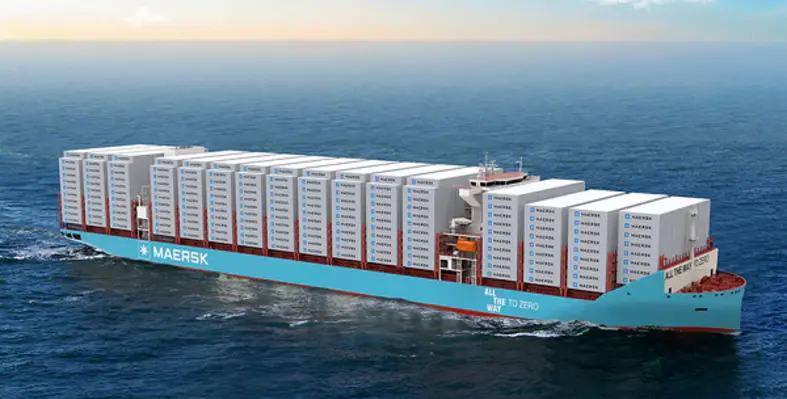Achieving climate-friendly transportation is a hot topic for the maritime sector, with leading shipping companies spearheading the charge to net-zero operations
The impetus to deliver green shipping has been emphasised by the International Maritime Organisation (IMO) revising its 2018 strategy. At the start of July, member states of IMO adopted a 2023 IMO Strategy on Reduction of GHG Emissions from Ships, with enhanced targets to tackle harmful emissions – formerly targeted to reduce emissions from ships by 50% by 2050. The revised strategy enhances the common ambition to reach net-zero GHG emissions from international shipping close to 2050 as well as a commitment to ensure an uptake of alternative and near-zero GHG fuels by 2030.
IMO secretary-general, Kitack Lim, commented, “The adoption of the 2023 IMO Greenhouse Gas Strategy is a monumental development for IMO and opens a new chapter towards maritime decarbonisation. At the same time, it is not the end goal, it is in many ways a starting point for the work that needs to intensify even more over the years and decades ahead of us. However, with the revised strategy that you have now agreed on, we have a clear direction, a common vision, and ambitious targets to guide us to deliver what the world expects from us.
“Above all, it is particularly meaningful, to have unanimous support from all member states. In this regard, I believe that we have to pay more attention to support developing countries, in particular SIDS and LDCs, so that no one is left behind.”
The new standards embraced by IMO are a commendable step in the direction of sustainable shipping. While no doubt this will have an impact by encouraging the industry to take a more active role in reducing its climate footprint, environmental policies are not something that the international shipping industry has been taking lightly. Indeed, as outlined by maritime research consultancy, Drewry, of the world’s leading 10 carriers, eight have already confirmed net zero targets by 2050, with one aiming for 2060 and the other previously indicating their ambitions in line with IMO expectations.
The consultancy continued by noting that there is a common thread of commitment to buying more fuel-efficient and less polluting ships and that the order book highlights a clearly-visible green shift. While the process of cleaning the containership fleet is in its infancy and will take time, there is substantial investment going into greener ships and making operations more environmentally-friendly, a trend that will not only help the environment but provide opportunities for those companies who can help deliver this.
Aiming for alternatives
In recent months, A.P. Moller – Maersk (Maersk) has demonstrated its commitment to net-zero (which it is aiming to achieve across the entire business by 2040) by focusing on green fuel. In June, the company announced that it will retrofit an existing ship to a dual-fuel methanol-powered vessel. The engine retrofit is scheduled to be conducted in 2024 by MAN Energy Solutions and the intent is to replicate on sister vessels from 2027.
“Retrofitting of engines to run on methanol is an important lever in our strategy. With this initiative, we wish to pave the way for future scalable retrofit programmes in the industry and thereby accelerate the transition from fossil fuels to green fuels. Ultimately, we want to demonstrate that methanol retrofits can be a viable alternative to new buildings,” commented Leonardo Sonzio, head of fleet management and technology at Maersk.
The company quickly followed this announcement by declaring that it has also placed an order for six mid-sized, dual-fuel container vessels which will be able to operate on green methanol. Yangzijiang Shipbuilding Group will build the 9,000 TEU vessels which will be delivered in 2026 and 2027. In doing so, Maersk now has 25 methanol-enabled vessels on order.
Not to be outdone, international shipping and container transportation company, HapagLloyd has introduced “Ship Green”, an accessible customer solution for climate-friendly transportation based on biofuel. In the first rollout stage, customers can add Ship Green as an additional service to their existing bookings, allowing them to choose among three different levels of avoidance in carbon dioxide equivalent (CO2e) emissions: 100%, 50% or 25%.
The avoidance results from the use of biofuel instead of conventional marine fuel within the company’s fleet which derives from second generation feedstock sourced from certified supply chains and produced from waste material such as brown grease or cooking oil. Currently, Ship Green is only available for dry cargo, but it will be expanded to other cargo types in the future.
Wärtsilä Corporation has taken an active role to help operators reduce emissions, having long-identified investor engagement in green shipping. The technology group has indicated its intention to lead the way in maritime decarbonisation, providing companies with technologies that lay the groundwork for a net-zero future. Specifically, Wärtsilä Marine Power specialises in power, propulsion and lifecycle solutions for the marine market, from end-to-end digital ecosystem planning to future fuels development.
Most recently, it has been contracted by Stena Line to carry out and convert a number of vessels to operate with methanol fuel. The conversions will include the fuel supply system and engine modifications, as well as integrating the new installations with the ships’ existing systems.
Read the full report, including an overview of the technology being developed and deployed to reduce maritime emissions in the latest issue of African Review: https://africanreview.com/magazine-archives/african-review-august-2023













